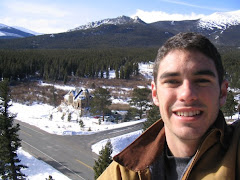This week I attended a Congress on the Anthropology of the Human Person. It was my first introduction to the Spirituality of the Christian Life Movement. Now, I think that I'm a pretty smart guy, and I have studied philosophy in the past, but this stuff was pretty heavy. I was extremely impressed with the intellectual firepower this Movement has.
I'm not going to claim to be able to summarize everything that I heard this week, but what I will try to do is take some of the pieces I grasped (it's more difficult to understand complex philosophy when it's being translated by non-professionals than one would think, although they did a great job for not being professionals, yet some things were certainly lost in translation).
The CLM Spirituality seems to be able to analyze the current issues of today, in a non-political way, and tear these approaches down philosophically, revealing the core beliefs about humanity that many of these ideologies claims.
Also, they draw on classic philosophy to explain how civilizations developed, and they also consider current philosophical movements and how they're causing the turmoil that we're seeing today. The other important piece, they note, is the technological and communicative change we are experiencing, thereby shrinking the world. Many of these philosophies are able to attack and gain followers so much more quickly, and without a proper analysis of what the end result of the ideology is - think marketing and packaging.
Topics at the conference included (translated by me, so they may not be exact):
- Carism and Spirtuality
- The Human Person and our Fundamental Dynamism
- The Human Person and our Relational Dynamic
- Fundamentals of Industrial Anthropology in Greek thought
- Body, Soul, and Spirit in the Sacred Scripture
- The Human Person, made in the Image and Likeness of God
- The Vision and Trial of Man
- Original Sin and key anthropology
- The Lord, Forgiveness and Revelation of the Human Person
- The Human Person and Free Cooperatoin with Grace
I think I've met more professionals (ie. doctors, lawyers, professors, etc.) in 3 weeks here than I've met in my life. The thing that is really appealing, is that they just don't work as professionals, they do their work for the most disadvataged, while at the same time working on intellectual initiatives. It's a great balance that I hope to achieve.
These men are called "Sodalites" http://en.wikipedia.org/wiki/Sodalite, a sodalite is a "form fitting rock", think St. Peter, "the Rock." It's also rare, but found in large numbers (like the Movement). I don't know if they were named after this rock, or if it's just a coincidence, but it's a neat connection.
Clarification: The Sodalites are not named after the rock. The founder of the
sodalites found them in a rock shop on his birthday one day and made the
connection symbolically. The rock actually stands for (reconciliation). The
rocks are mostly found in Brazil and parts of Canada. They are bright blue rocks
(color of Mary).
Well, today is the SuperBowl and I haven't really found anyone that cares about American Football, so I'm going to throw my own party. I'm thinking about ordering some Dominos and having a traditional SuperBowl Party for myself!




The Sodalites are not named after the rock. The founder of the sodalites found them in a rock shop on his birthday one day and made the connection symbolically. The rock actually stands for (reconciliation). The rocks are mostly found in Brazil and parts of Canada. They are bright blue rocks (color of Mary).
ReplyDelete